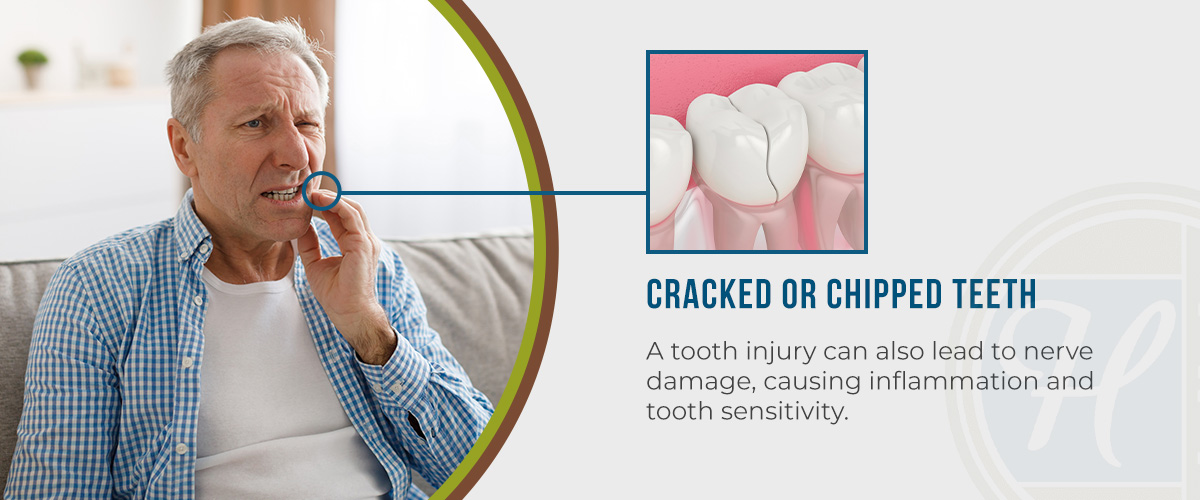Common Reasons for Root Canal Treatment
July 24, 2024 6:11 pm
Common Reasons for Root Canal Treatment
Each year, dentists perform millions of root canal procedures. This treatment can essentially save a tooth that would otherwise be lost to a painful infection. Although root canals are often considered a painful solution, they are more of a pain-relieving procedure that has saved millions of natural teeth over the decades.
What is a root canal, and how do you know if you need one? We will explain the procedure and the common reasons for root canal treatment.
What Is a Root Canal?
Endodontic therapy, also known as root canal treatment, is a type of dental procedure that treats an infection of the tooth pulp. A tooth consists of three primary layers — the pulp is the innermost layer, encased by a secondary layer of dentin covered by a protective enamel layer. Nerves, blood vessels and connective tissue make up the pulp.
During the procedure, the dentist accesses the pulp by making an opening at the top of the tooth. They remove the infected pulp with intricate dental tools and precision skills. The dentist then cleans and reshapes the root canal to prepare the tooth for a filling.
Next, the dentist fills the root canal with a rubber-like substance called gutta-percha, which comes from a Malaysian tree. Finally, they use a filling to encase the top of the tooth. By removing the infected pulp, a root canal can save the tooth from decay.
After the procedure, you will need to revisit the dentist. During the follow-up appointment, the dentist may remove the initial filling and install a permanent crown or perform another form of restoration.
Root Canal Causes and Symptoms
Only your dentist can diagnose the need for a root canal. However, there are warning signs and root canal symptoms. Here are some of the most common reasons your dentist may recommend a root canal.
Swollen Gums
Swollen, painful gums are always a good reason to visit the dentist. The swelling of soft gum tissue can result from various oral health concerns, ranging from an abscessed tooth and gingivitis to tooth decay and infection. If an infected pulp causes swelling, the swelling may either come and go or worsen over time.
Gum pain and inflammation can make eating, drinking and even speaking unpleasant. Instead of hoping the swelling subsides on its own, visit your dentist to seek treatment. Whether this symptom is caused by the early stages of gum disease or an infected pulp, your dentist can alleviate your discomfort.
Tooth Decay
A buildup of plaque usually causes tooth decay. When a thick layer of sticky plaque film covers a tooth, it hardens and becomes tartar, which is difficult to remove. Over time, dental plaque and tartar can wear down the protective enamel layer and cause tooth decay. When this happens, bacteria can enter the soft pulp tissue and cause an infection.
Tooth decay often causes symptoms like constant toothache, tooth sensitivity and inflamed gums. If you notice any of these symptoms, schedule a dental appointment. Professional dental cleanings can remove plaque and tartar buildup, and dental treatments like a root canal can treat pulp infections.
Cracked or Chipped Teeth

If you have endured a tooth crack or chip from biting down on a hard food or object, a blow to the facial area or any other kind of accident, you might need a root canal. When a tooth cracks or chips, damage to the protective enamel layer can expose the pulp, allowing bacteria to enter.
A tooth injury can also lead to nerve damage, causing inflammation and tooth sensitivity. A root canal can solve both of these issues by removing the delicate pulp inside the injured tooth.
Loose Teeth
A loose tooth can result from a number of different things, including gum disease, trauma, bruxism, certain medications and an infected pulp. However, stay calm if you notice a loose tooth — your dentist might be able to save it.
If your tooth has become loose due to an infected pulp, removing the pulp can ease discomfort. Root canal treatment will reinforce the tooth with filling. Even when gingivitis causes a loose tooth, dental treatments can help restore gum health.
Tooth Discoloration
Another common symptom of an infected pulp is tooth discoloration. When the structure of the tooth begins to break down due to an infection, the damage can cause the tooth to become gray or even black. Tooth discoloration is more noticeable in the front teeth.
There are also several other causes of tooth discoloration. Unlike brown and yellow staining, which a lack of dental hygiene could cause, gray discoloration can result from aging, tooth trauma, dental restorations, tooth decay and a rare genetic disorder called dentinogenesis imperfecta. This disorder weakens teeth and causes a blue-gray color. An expert dentist can find the cause of discoloration and recommend the most suitable restorative treatment plan.
Are Root Canals Painful?
Root canal treatment has a reputation for rousing fear, even in those who don’t generally experience dental anxiety. However, modern root canals are not as painful as you might assume — these procedures are no more unpleasant than a standard filling, and the procedure itself is not painful at all. In fact, the most painful part often occurs before the procedure — infections and damaged nerves that affect the tooth and gum are the core causes of discomfort.
You will receive an anesthetic to numb the nerves in the affected tooth. As soon as the anesthetic kicks in, the dentist will begin the procedure. Following the procedure, it’s normal to experience mild to moderate pain. However, your dentist will recommend pain medication to help you manage the discomfort, which should ease within a few days.
Contact Henson Family Dental to Learn More
If you are experiencing any of the symptoms listed above, you may need a root canal. Rather than endure the discomfort, Henson Family Dental can diagnose and treat your symptoms. As a family-centric dental practice, we treat all our patients like family, with empathy, compassion and understanding.
Our team of expert dentists takes pride in getting to know each patient during the first consultation. You’ll know what to expect from your treatment plan each step of the way, from diagnosing oral health concerns to discussing financial options. If you do need a root canal, one of our expert dentists will explain each step of the procedure so that you know exactly what to expect.
Contact us online to learn more about our root canal procedures.

